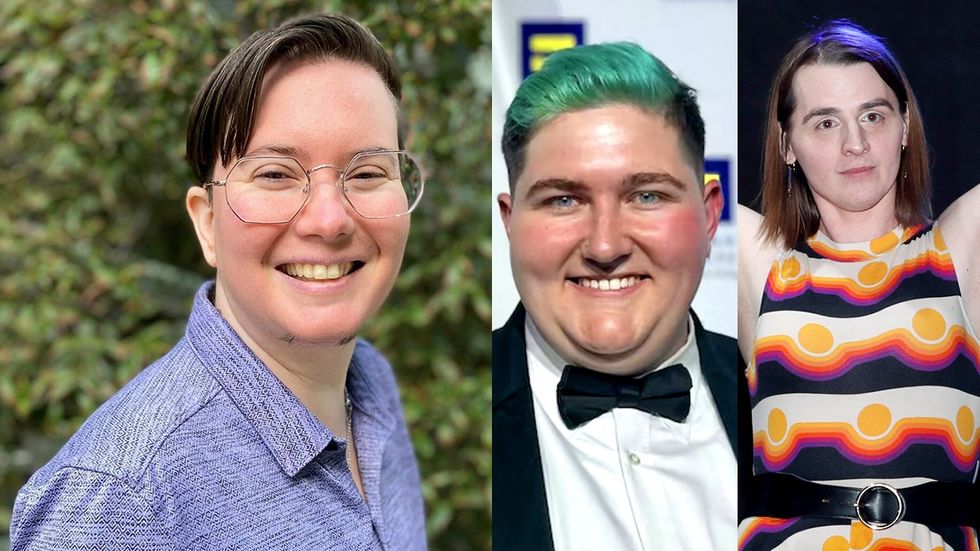On December 16, 2022, shortly after watching the Kentucky legislature debate his right to exist, Henry Berg-Brousseau, a 24-year-old transgender activist, killed himself. He had spoken publicly and campaigned against anti-trans legislation since he was 16. Meanwhile, in April of 2023, the Montana House of Representatives banned Rep. Zooey Zephyr—that body’s first trans representative—from the House chambers after she shared that the parents of a trans teenager reached out to her to report that their child attempted suicide while watching a recent hearing for an anti-trans bill. These bills are acts of genocide aimed at eliminating trans, queer people, and our culture. The trans community responded with ripples of pain. I held my breath. And cried.
Legislation that killed Henry is being debated and passed all over the United States. The ACLU reported 510 anti-trans bills in 2023, of which 84 passed. Today, 504 are still active, according to Anti-Trans Bill Tracker. This is a steep increase from the 26 anti-trans laws passed in 2022.
A refugee crisis is building in America, according to the Data for Progress Survey, and their research suggests that anti-trans legislation has caused 104,000 Transgender people to flee their home state. The survey also reveals that over a million trans people will move in the coming months. I’m one of them. Why would so many of us in the trans community turn our lives over and start again in a new state or country? Consider what we are facing at home.
I decided to transition right before my 30th birthday. I had known I was male since I was very young, but throughout my life, I had been afraid I would lose everything if I transitioned. In a way, that was true—though in other ways, it wasn’t. My father accepted me as his son and said he’d always sort of known. But my fiancé left me because he couldn’t handle the stigma of being gay. I struggle to get work, and I’m offered lower pay than before. People started staring at me in public and harassing me. Discrimination by healthcare professionals has left me injured and depressed.
I’ve had to fight back against that hate with all my strength. I have had to proclaim to myself that I am normal and natural. This is how things have always been. And I am not going anywhere.
The Mahabharata, a 5,000-year-old story, has the earliest known written example of a “female-to-male” person: the honorable Warrior Prince Shikhandi. Trans people have always existed; in many societies, we have been a part of everyday life. We should be accepted today. In times like these, I think of trans people past and present and how their strength gives me strength.
My 40th birthday is coming up, and while it has been painfully difficult to be excluded from the larger society, I have never regretted my transition. I feel alive again. I can look at myself in the mirror. I feel like myself instead of an imposter. That is what transition has given me.
But while transitioning saved my life, it has also exposed me to anti-trans hatred and governmental discrimination. Due to the new waves of anti-trans legislation, moving out of the country has become a serious consideration. Anti-trans provisions are already reaching the federal level through congressional bills. These attacks on trans rights have opened doors to discrimination and increased violence.
I wake up with dread and find myself feeling a constant murmuring worry because I know the history of what has happened to trans people in previous eras of anti-trans discrimination.
In pre-war Nazi Germany, many individuals from marginalized communities decided to remain in Germany. They tried to change the political tides and secure their fundamental human rights from within. Some stayed too long, and when they realized their lives were on the line, Germany closed its borders so no one could escape. Transgender people, journalists, and political opponents were among the first to die in the camps. The first Nazi book burnings were at the Institute of Sex Research, which focused on transgender people and where some of the first modern trans-affirming medical care in Europe had taken place.
The laws that have passed and the arrests that have already taken place paint a chilling picture of just how close we are to fascism. Worse, it is a clear demonstration of how many local and state governments and leaders are trying to eradicate trans individuals.
The most troubling aspect is the deafening silence about what is happening in many of our communities. It’s on the news, but many don’t want to discuss it. In fact, some people sneer at my growing concern. Yet I watch, horrified, the trauma of trans youth killing themselves while watching trans bills debated in the legislature. I see people losing access to life-saving medical care. I watch hate crimes escalate and the number of murdered trans women increase. I find myself sobbing.
I am watching with bated breath as people die. I ask myself daily, what can I do? I remember the trans people who died before me. And I wonder if I should stay and fight or flee before it’s too late.
The urgency of this issue demands attention, empathy, and action. We must not allow the struggles faced by trans individuals to be ignored. We, as a society, must unite in our support of trans and queer people. We can create a future where everyone has the right to exist by raising awareness, challenging oppressive laws, and advocating for change.
Until then, I am reading about other countries, checking ticket prices, and holding my breath.
Niles Woods is a mental health professional with a decade of experience, and has spent the last eight years dedicated to counseling, offering low cost therapy to LGBTQPIA+ and other oppressed groups on their healing journey. He is a PhD candidate at Antioch University, showcasing a commitment to both practical expertise and systemic change. Niles is an active member in the trans community. He began his own transition nine years ago and continues to embody authenticity and self-discovery.
Have an inspiring personal story to tell? Want to share an opinion on an issue? Learn more by visiting advocate.com/submit.













































































